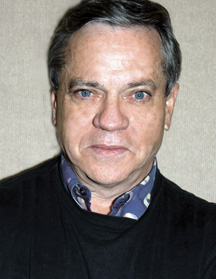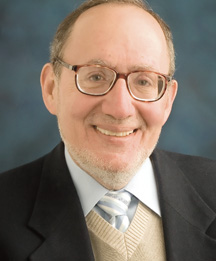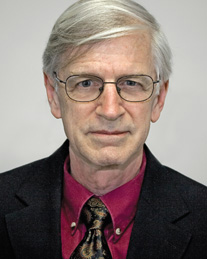Beverley, Borovetz, Hendrix Named Dinstinguished Professors
The University of Pittsburgh is honoring three faculty members as Distinguished Professors, the highest honor that can be accorded a member of the professoriate. They are John R. Beverley, a professor in the Department of Hispanic Languages and Literatures in the School of Arts and Sciences; Harvey S. Borovetz, chair and professor in the Swanson School of Engineering’s Department of Bioengineering; and Roger Hendrix, a professor in the School of Arts and Sciences’ Department of Biological Sciences.
The rank of Distinguished Professor recognizes extraordinary, internationally recognized scholarly attainment in an individual discipline or field. Pitt Chancellor Mark A. Nordenberg has made the appointments—which will become effective Sept. 1—based on the recommendations of Pitt Provost and Senior Vice Chancellor James V. Maher.
Biographical information on the faculty honorees follows.
 John R. Beverley
John R. BeverleyJohn R. Beverley
Beverley, a professor of Hispanic languages and literatures and adjunct professor in Pitt’s Departments of English and Communication, began his career as a specialist in Spanish Golden Age literature and shifted his focus to Latin American literature and cultural theory. He is a faculty associate in Pitt’s Center for Latin American Studies, Graduate Program in Cultural Studies, and Film Studies Program, and a member of the executive committee of the new Pitt Humanities Center. Beverley’s association with the University goes back to 1969, when he arrived at Pitt as a lecturer in Hispanic languages and literatures. One of the pioneers of the postcolonial turn in Latin American criticism, Beverley was a founding member of the Latin American Subaltern Studies Group, which had a high-profile impact on Latin American studies during the 1990s. His publications include some 100 articles and 15 authored or edited books. His recent writing concerns the political implications of Latin American cultural theory with a new collection of essays scheduled for release in Latin America this year, and a new book due out from Duke University Press this year. Beverley chaired the Hispanic languages and literatures department from 2002 to 2007 and currently is associate director of the International Institute of Latin American Literature as well as coeditor of the University of Pittsburgh Press series Illuminations: Cultural Formations of the Americas. Beverley earned his bachelor’s degree from the Department of Romance Languages at Princeton University in 1964, followed by a master’s degree from the Department of Spanish and Portuguese at the University of Wisconsin in 1966. He received his PhD from the Department of Literature at the University of California at San Diego in 1972.
 Harvey S. Borovetz
Harvey S. BorovetzHarvey S. Borovetz
Borovetz is chair and a professor in the Department of Bioengineering, the Robert L. Hardesty Professor of Surgery in the Pitt School of Medicine, and a professor in the Swanson School’s Department of Chemical and Petroleum Engineering; he also is deputy director of artificial organs and medical devices in the Pitt-UPMC McGowan Institute for Regenerative Medicine. His research focuses on the design and clinical use of cardiovascular organ replacements—such as a miniature blood pump-based device—for both adults and, particularly, children. He has served as the founding director and now as the bioengineering faculty liaison for the University’s clinical bioengineering program in mechanical circulatory support. Founded in 1986, the program supports patients who are implanted with a left ventricular-assist device, or biventricular assist devices, as a bridge to cardiac transplantation or recovery. Borovetz was awarded the William J. von Liebig Foundation’s 1990 Award for Vascular Surgery Research for a decade-long project investigating the role of hemodynamics—blood flow—in vascular biology and treatment. He was appointed chair of bioengineering in 2002, and since then the number of full-time faculty members in the department has increased to 20, with more than 100 faculty members having secondary academic appointments. Borovetz is a fellow of the American Institute of Medical and Biological Engineering, a past member of the American Society for Artificial Internal Organs Board of Trustees, and a past member of the Biomedical Engineering Society Board of Directors. He has undertaken part-time sabbaticals at the National Institutes of Health’s (NIH) Bioengineering Research Group of the National Heart, Lung, and Blood Institute and served on numerous NIH study sections. Borovetz also has served as a panelist for the U.S. Department of Commerce regarding its National Technology Initiative. He received his BA in physics from Brandeis University in 1969 and his MS and PhD in bioengineering from Carnegie Mellon University in 1973 and 1976, respectively.
 Roger Hendrix
Roger HendrixRoger Hendrix
In his research, Hendrix, a professor of biological sciences, investigates the mechanisms through which bacteriophages—tiny viruses that infect bacteria—assemble within a bacterium cell prior to traveling to the next cell. After assembly, the viruses are released from the infected cell, acting as little “spaceships” that protect the virus DNA until it can infect another cell. The assembly of the protein structure that transports the DNA is complicated and specific, and to understand it would provide insight into the assembly of biological structures in general. Hendrix also studies the evolution of viruses by looking at the evolution of bacteriophages. Because viruses do not leave behind physical evidence, Hendrix instead tracks the evolutionary histories of phages by comparing their DNA sequences. When applied to evolution in general, the bacteriophages illustrate on a manageable and faster-paced scale how select populations of similar organisms survive while others do not. Hendrix received the 2009 National Academy of Sciences Award for Scientific Reviewing in Genetics for his extensive writing for academic journals and books about bacteriophage research—both his own and in the field at large—during the past 10 years. The academy recognized Hendrix’s ability to synthesize existing ideas and research in review articles and in journal commentaries. Hendrix cofounded and codirects the Pitt-based Pittsburgh Bacteriophage Institute, which includes researchers and students from around the world working to better understand bacteriophages and their practical applications. Hendrix joined Pitt’s biological sciences department in 1973. He received his BS in 1965 from the California Institute of Technology and his PhD in 1970 from Harvard University, where he studied under James D. Watson, a corecipient of the 1962 Nobel Prize in Physiology or Medicine for his work in uncovering the structure of DNA.
Other Stories From This Issue
On the Freedom Road

Follow a group of Pitt students on the Returning to the Roots of Civil Rights bus tour, a nine-day, 2,300-mile journey crisscrossing five states.
Day 1: The Awakening
Day 2: Deep Impressions
Day 3: Music, Montgomery, and More
Day 4: Looking Back, Looking Forward
Day 5: Learning to Remember
Day 6: The Mountaintop
Day 7: Slavery and Beyond
Day 8: Lessons to Bring Home
Day 9: Final Lessons

